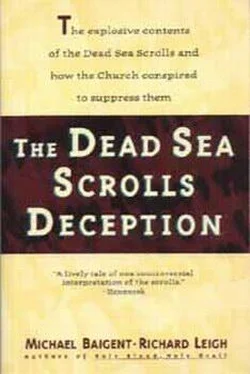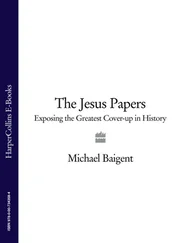In reality, there was a fairly sophisticated logic governing such self-immolation, which would not have been readily apparent to Josephus’ readers, either at the time or subsequently. The mass suicides at Masada, at Gamala and at other sites are explained by Eisenman as resting ultimately on the uniquely ‘Zealot’ concept of resurrection. This concept derived primarily from two Old Testament prophets, Daniel and Ezekiel, both of whose texts were found among the Dead Sea Scrolls at Qumran. Daniel (Daniel 12:2) was the first to give expression to the concept in any developed form: ‘Of those who lie sleeping in the dust of the earth many will awake, some to everlasting life, some to shame and everlasting disgrace.’ He speaks, too, of an imminent ‘Kingdom of Heaven’, and of ‘End Times’, of the ‘coming of an anointed Prince’, of a ‘Son of Man’ on whom ‘was conferred sovereignty’ (Daniel 7:13-14).
In Ezekiel, the relevant passage is the famous vision of a valley filled with dry bones, all of which, God announces, will live again:
I mean to raise you from your graves… and lead you back to the soil of Israel. And you will know that I am Yahweh, when I open your graves and raise you from your graves… And I shall put my spirit in you, and you will live…’ (Ezekiel 37:12-14)
So important was this passage deemed to be that a copy of it was found buried under the floor of the synagogue at Masada. 6
The concept of resurrection derived from Daniel and Ezekiel was picked up and adopted by the original ‘zealots for the Law’, the Maccabees. Thus, in the second book of Maccabees, it is used to encourage martyrdom for the sake of the Law. In 2 Maccabees 14:42, an Elder of Jerusalem kills himself rather than be captured and suffer outrages. In 2 Maccabees 6:18ff., a priest and teacher of the Law kills himself as an ‘example of how to make a good death… for the venerable and holy laws’. This incident, according to Eisenman, is the prototype for the establishment of later Zealot mentality. The principle finds its fullest expression in 2 Maccabees 7, where seven brothers submit to death by torture rather than transgress the Law:
Said one brother, ‘… you may discharge us from this present life, but the king of the world will raise us up, since it is for his laws that we die, to live again for ever.’
Another said, ‘It was heaven that gave me these limbs; for the sake of his laws I disdain them; from him I hope to receive them again.’
The next said to his tormentors, ‘Ours is the better choice, to meet death at men’s hands, yet relying on God’s promise that we shall be raised up by him; whereas for you… there can be no resurrection, no new life.’
Here then, in the pre-Christian book of Maccabees, is the principle of bodily resurrection that will figure so prominently in later Christian theology. It is available, however, as the third of the above speeches makes clear, only to the righteous, to those ‘zealous for the Law’.
But there is another point of relevance in the passage devoted to the death of the seven brothers. Just before the last of them is to be executed, his mother is brought in to see him. She has been urged to plead with him to submit and thereby save himself. Instead, she says to him that ‘in the day of mercy I may receive you back in your brothers’ company’ (2 Mace. 7:29). At the end of time, those who die together will be resurrected together. Thus Eleazar, in his exhortation to the garrison of Masada, urges them to die ‘in company with our wives and children. That is what the Law ordains.’ Not the Law of the ‘Sadducee’ establishment or of later Judaism — only the Law of the so-called ‘Zealots’. Had the women and children in the fortress been left alive, they would not have been exterminated by the victorious Romans. But they would have been separated from their menfolk and from each other. And many of them would have been enslaved, raped, consigned to Roman army brothels and thereby defiled, bereft of their ritual purity according to the Law. At Masada, separation and defilement were feared more than death, since death, for the ‘Righteous’, would have been only temporary. Here then, among the ferocious defenders of Masada, is a principle of bodily resurrection virtually identical to that of later Christianity.
The garrison who defended Masada can hardly be reconciled with traditional images of placid, peace-loving Essenes — who, according to adherents of the consensus, made up the community at Qumran. And indeed, as we have noted, adherents of the consensus continue to insist that no connection can possibly have existed between the Qumran community and the garrison at Masada, despite the discovery at Masada of texts identical to some of those found at Qumran — found at Qumran and, in at least two instances, found nowhere else — and despite the use by the defenders of Masada of precisely the same calendar as that used by the Qumran material: a unique solar calendar, in contrast to the lunar calendar of the official ‘Sadducee’ establishment and of later rabbinical Judaism.
Once again, there can be discerned the configuration of what Eisenman has described: a broad messianic nationalistic movement in which a number of supposed factions, if there was ever any distinction between them, effectively merged. Eisenman’s explanation accommodates and accounts for what has previously seemed a welter of contradictions and anomalies. It makes sense, too, of the mission on which Paul is dispatched by James and the hierarchy of the so-called ‘early Church’ — the ‘Nazorean’ enclave — in Jerusalem. In biblical times, it must be remembered, ‘Israel’ was not just a territory, not just a particular tract of land. Even more important, ‘Israel’ denoted a people, a tribe, a ‘host’. When Paul and other ‘evangelists’ are sent forth by the hierarchy in Jerusalem, their purpose is to make converts to the Law — that is, to ‘Israel’. What would this have meant in practical terms, if not the recruitment of an army? Since Old Testament times, and especially since the ‘Babylonian Captivity’, the ‘tribe of Israel’ had been scattered across the Mediterranean world and beyond, on into Persia — where, at the time of Simeon bar Kochba’s rising in ad 132, there was still enough sympathy to elicit at least a promise of support. Were not the emissaries of the Jerusalem hierarchy sent to tap this potentially immense source of manpower — to ‘call to the colours’ the dispersed people of ‘Israel’ to drive the Roman invaders from their native soil and liberate their homeland? And Paul, in preaching a wholly new religion rather than mustering recruits, was, in effect, depoliticising, demilitarising and emasculating the movement. 7This would, of course, have been a far more serious matter than merely lapsing from dogma or certain ritual observances. It would have been, in fact, a form of treason. For the Law, as it figures in the Dead Sea Scrolls, is not wholly confined to dogma and ritual observances. Running throughout the Qumran texts, as a sacred duty, there is clearly a thrust to build a legitimate messianic persona, whether royal, or priestly, or both. By implication, this would involve the re-establishment of the ancient monarchy and priesthood, to drive out the invader, to reclaim and purify the Holy Land for the people chosen by God to inhabit it. In the words of the ‘War Scroll’: ‘The dominion of the [invaders] shall come to an end… the sons of righteousness shall shine over all the ends of the earth.’ 8
16. Paul — Roman Agent or Informer?
With this grand design in mind, it is worth looking again at the confused and sketchy description of the events that occur towards the end of the Acts of the Apostles. Paul, it will be remembered, after a prolonged evangelistic mission abroad, has again been summoned to Jerusalem by James arid the irate hierarchy. Sensing trouble, his immediate supporters exhort him repeatedly, at each stage of his itinerary, not to go; but Paul, never a man to shrink from a confrontation, remains deaf to their appeals. Meeting with James and other members of the community’s leadership, he is again castigated for laxity in his observation of the Law. Acts does not record Paul’s response to these charges, but it would appear, from what follows, that he perjures himself, denying the accusations against him, which his own letters reveal to have been justified. l In other words, he recognises the magnitude of his offence; and however fierce his integrity, however fanatic his loyalty to ‘his’ version of Jesus, he acknowledges that some sort of compromise is, this time, necessary. Thus, when asked to purify himself for seven days and thereby demonstrate the unjustness of the allegations against him, he readily consents to do so. Eisenman suggests that James may have been aware of the true situation and that Paul may well have been ‘set up’. Had he refused the ritual of purification, he would have declared himself openly in defiance of the Law. By acceding to the ritual, he became, even more than before, the ‘Liar’ of the ‘Habakkuk Commentary’. Whatever the course of action he chose, he would have damned himself- which may have been precisely what James intended. 2
Читать дальше












